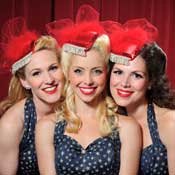Wednesday, November 9, 2011
Some writers spend a lifetime searching for their subject and voice. G. Mark LaFrancis found his in the stories of soldiers and their families. LaFrancis is the author of the series "In Their Boots: Poems Inspired by Soldiers and Their Loved Ones"(Booklocker.com, 2008, $13.95). The first book, 7 was published in 2008. "Book Two: Families," came out Nov. 1. He is also the co-creator of the "Never Forget Tour Honoring Fisher House." It's a project that brings recording artists and the multi-media "In Their Boots" program to military hospitals and Fisher House homes for soldiers and their families.
LaFrancis will present "In Their Boots" Tuesday, Nov. 15, at Millsaps College. The program, part of the school's Arts and Lecture Series, pays tribute to American men and women in uniform in every war. The Victory Belles from the World War II Museum in New Orleans will perform such World War II-era favorites as "Boogie Woogie Bugle Boy," "Chattanooga Choo-Choo" and "I'll Be Seeing You" in three-part harmony.
"The program is deeply moving," LaFrancis said.
"Bring a Kleenex. Bring two."
LaFrancis writes what he calls story poems based on conversations he had with soldiers and their families. He wrote the blank verse poems in the voices of the speakers as they tell their experiences in Iraq, Afghanistan and on the homefront.
Retired from the U.S. Air Force, LaFrancis is the director of public information at Copiah-Lincoln Community College's campus in Natchez, where he also teaches journalism.
"I never went to Vietnam," he said. "My father was in World War II, and my grandfather was in World War I, so I do have a special affinity with veterans."
Describe the "In Their Boots" program.
The format is a PowerPoint with graphics and music. The PowerPoint displays all the poetry that's performed. There are photos of soldiers that they have allowed me to use that were taken in Iraq and Afghanistan. It's a complete journey. The poem stories are ones I wrote based on intimate conversations I've had with soldiers and their families over the last five years.
Are all the story poems sad?
Some are funny, some are sad. I don't apologize if I move people to tears. But there are funny ones in there, too. The most popular is "Me and My MRE." There's humor in war, but there's also sadness, and I bring that out. And there's longing. I lived through that when I was stationed in the South Pacific. None of them rhyme except for "My MRE." It had to be silly and Seuss-like. It gets the audience chuckling.
Where did you get the inspiration?
It all started with a student here at Co-Lin. He was a sniper with the Marines in Fallujah (Iraq). I had prayed for quite a while to find a way to do something meaningful about this war, and he walked into my office.
Where do you find the soldiers to interview?
Anywhere and everywhere—bases, hospitals, airports. Most are in Mississippi and Louisiana. I'm trying to give voice to the voiceless, these young men and women and their families who have fallen underneath the public's eye. The poem stories are first-person. That way, it gives me a way to embody them. I don't name them or identify their circumstances.
What response have you gotten to your books?
Fabulous. I've had people who have told me they feel as if they're walking in the shoes of the soldiers and their families. Soldiers and their families say it's the voice they had prayed someone would hear. The war on terror isn't like World War II when everyone sacrificed, from rationing to scrap metal drives, and felt like they were part of the war effort.
Do today's soldiers and their families feel that most Americans don't appreciate their sacrifice?
They believe that they make the sacrifice knowing full well what could happen. They also know and feel the public does not know of the sacrifices that soldiers have made. I don't sense anger, but I sense that they feel neglected. But they're a strong people, and they are very proud.
Did you always want to be a writer?
I developed a love for reading and writing when I was 8. (My family) kind of dismissed it. I come from a long line of blue-collar workers.
Why self-publish?
The traditional book-publishing world has shrunken, and the need to keep control over my work is important to me. I think self-publishing is great. It has been a wonderful experience. I wouldn't trade my experience for anything.
"In Their Boots" is Tuesday, Nov. 15, at Millsaps College. The event begins at 7 p.m. Tickets are $10. For information, call 601-974-1130.

Comments
Use the comment form below to begin a discussion about this content.
Sign in to comment
Or login with:
OpenID